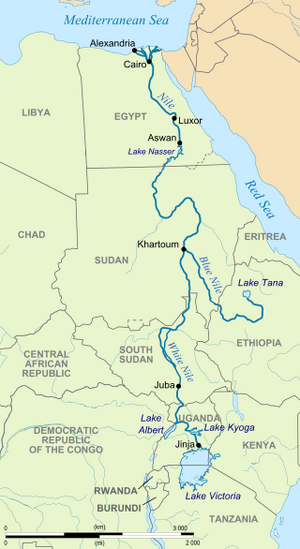Jinja Uganda
| Author:Laxman Burdak, IFS (Retd.) |
- For tribe see Jinja

Jinja is a town in Uganda.
Location
Jinja is in Jinja District, Busoga sub-region, in the Eastern Region of Uganda. The town is approximately 81 kms, by road, east of Kampala, the capital and largest city of Uganda. It sits along the northern shores of Lake Victoria, near the source of the White Nile.[1] The coordinates of Jinja, Uganda are 0°25'24.0"N, 33°12'24.0"E (Latitude:0.423333; Longitude:33.206667).
History
In 1954, the construction of the Owen Falls Dam submerged the Ripon Falls. Most of the "Flat Rocks" that gave the area its name disappeared under water as well. A description of what the area looked like can be found in the notes of John Hanning Speke, the first European to lay eyes on the source of the Nile:
- Though beautiful, the scene was not exactly what I expected, for the broad surface of the lake was shut out from view by a spur of hill, and the falls, about twelve feet deep and four to five hundred feet broad, were broken by rocks; still it was a sight that attracted one to it for hours. The roar of the waters, the thousands of passenger fish leaping at the falls with all their might, the fishermen coming out in boats, and taking post on all the rocks with rod and hook, hippopotami and crocodiles lying sleepily on the water, the ferry at work above the falls, and cattle driven down to drink at the margin of the lake, made in all, with the pretty nature of the country—small grassy-topped hills, with trees in the intervening valleys and on the lower slopes—as interesting a picture as one could wish to see."[2]
Jat History
James Todd[3] writes that the origin of the Scythic nations, as related by Diodorus; . when it will be observed the same legends were known to him which have been handed down by the Puranas and Abulghazi.
The Scythians had their first abodes on the Araxes.[4] Their origin was from a virgin born of the earth[5] of the shape of a woman from the waist upwards, and below a serpent (symbol of Budha or Mercury) ; that Jupiter had a son by her, named Scythes," whose name the nation adopted. Scythes had two sons, Palas and Napas (qu. the Nagas, or Snake race, of the Tatar genealogy ?), who were celebrated for their great actions, and who divided the countries ; and the nations were called after them, the Palians (qu. Pali ?)[6] and Napians. They led their forces as far as the Nile on Egypt, and subdued many nations. They enlarged the empire of the Scythians as far as the Eastern ocean,
[p. 71]: and to the Caspian and lake Moeotis. The nation had many kings, from whom the Sacans (Sakae), the Massagetae ( Getae or Jats), the Ari-aspians (Aswas of Aria), and many other races. They overran Assyria and Media . [7] , overturning the empire, and transplanting the inhabitants to the Araxes under the name of Sauro-Matians. [8]
As the Sakae, Getae, Aswa, and Takshak are names which have crept in amongst our thirty-six royal races, common with others also to early civilization in Europe.
People
The majority of the population are of Bantu origin. Lusoga is the main local language.
External links
References
- ↑ The Editors of Encyclopædia Britannica (13 January 2014). "Profile of Lake Victoria, East Africa". Britinnica.com.
- ↑ Kingston, W. H. G. (2007). "Great African Travellers, From Mungo Park to Livingstone and Stanley, The Project Gutenberg EBook of Great African Travellers". Gutenberg.org.
- ↑ James Todd Annals/Chapter 6 Genealogical history of the Rajput tribes subsequent to Vikramaditya, Vol I, pp.70-71
- ↑ The Arvarma of the Puranas ; the Jaxartes or Sihun. The Puranas thus describe Sakadwipa or Scythia. Diodorus (Mb. ii.) makes the Hemodus the boundary between Saka-Scythia and India Proper.
- ↑ Ila, the mother of the Lunar race, is the earth personified. Ertha of the Saxons ; e'pa of the Greeks ; ard in Hebrew [?].
- ↑ The Pali character yet exists, and appears the same as ancient fragments of the Buddha inscriptions in my possession : many letters assimilate with the Coptic.</
- ↑ The three great branches of the Indu (Lunar) Aswa bore the epithet of Midia (pronounced Mede), viz. Urumidha, Ajamidha, and Dvimidha. Qu. The Aswa invaders of Assyria and Media, the sons of Bajaswa, expressly stated to have multiplied in the countries west of the Indus, emigrating from their paternal seats in Panchalaka ? (Midha means ' pouring out seed, prolific,' and has no connexion with Mede, the Madai of Genesis X. 2 ; the Assyrian Mada.]
- ↑ Sun-worshippers, the Suryavansa.

